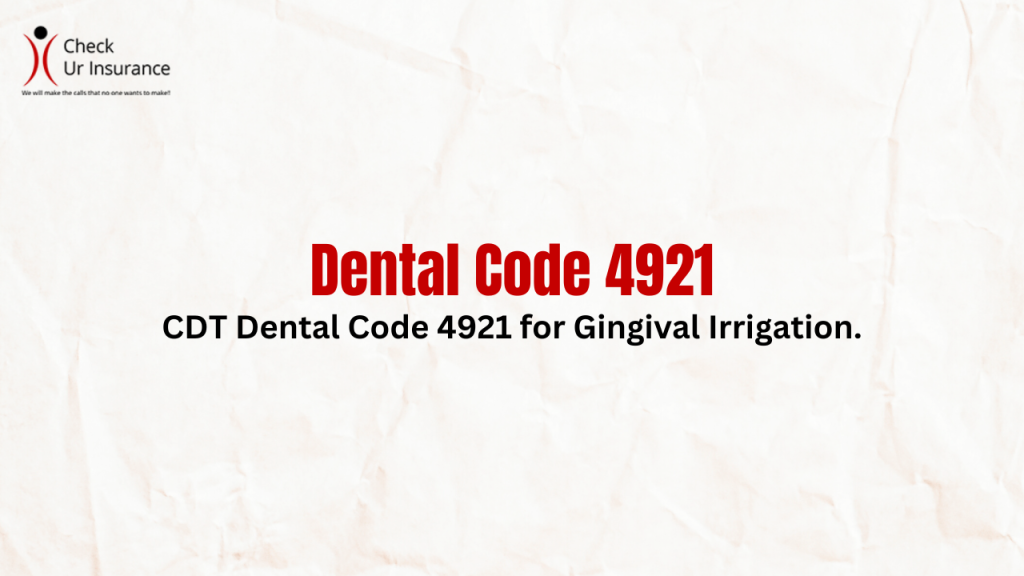CDT Dental Code 4921 for Gingival Irrigation
Precision is paramount, and one dental code for irrigation that stands out in periodontal care is dental code 4921 Gingival Pocket Irrigation. This targeted procedure aims to combat harmful bacteria in the interdental and subgingival areas, playing a crucial role in preventing and alleviating periodontal and gum diseases. Let’s delve into the specifics of this code and its significance in maintaining optimal oral health.

Table of Contents
Understanding the Essence of Gingival Pocket Irrigation
Gingival irrigation, as indicated by the D4921 code, serves a dual purpose: cleansing plaque from the interdental and subgingival regions. The primary objective is to thwart the colonization of harmful oral bacteria, thereby mitigating the severity of periodontal and gum diseases. This procedure is instrumental in maintaining oral hygiene and preventing the progression of dental issues.
The Role of D4921 in Antibacterial Delivery
An integral aspect of gingival pocket irrigation, particularly with the D4921 code, is the delivery of antibacterial agents, with Chlorhexidine being a common choice. This targeted delivery is aimed at reducing the bacterial load in the subgingival areas. By focusing on these specific regions, the procedure effectively disrupts the growth and proliferation of harmful bacteria, contributing to improved oral health outcomes.
D4921 Procedure: Breaking It Down
D4921 entails gingival pocket irrigation with antibacterial agents per quadrant, specifically designed for patients dealing with periodontitis or severe gingivitis. This precise coding ensures that the procedure is not only tailored to the individual’s oral health needs but is also thorough in addressing the unique challenges posed by periodontal issues.
Benefits of Dental Code 4921 in Periodontal Care
- Targeted Bacterial Removal: The procedure zeroes in on the interdental and subgingival areas, removing plaque and combating harmful bacteria where they are most likely to thrive.
- Prevention of Periodontal Diseases: By mitigating the severity of periodontal and gum diseases, D4921 plays a preventive role in maintaining optimal oral health.
- Antibacterial Precision: The inclusion of antibacterial agents, especially Chlorhexidine, ensures a precise and effective reduction in bacterial load.
- Customized Treatment: The per-quadrant application of dental code 4921 allows for a tailored approach, addressing specific areas of concern based on the patient’s periodontal condition.
How D4921 Differs From General Procedures
Generic procedures may fall short when it comes to addressing the nuances of periodontal care. Dental code 4921 stands out by specifically targeting the areas affected by periodontitis or severe gingivitis, providing a level of precision crucial for effective treatment and prevention.
Conclusion
Dental code 4921—Gingival Pocket Irrigation—is more than just a code; it’s a tailored solution for those grappling with periodontal issues. By focusing on targeted bacterial removal and the delivery of antibacterial agents, this procedure significantly contributes to the prevention and management of gum and periodontal diseases.
FAQs
How often should D4921 be performed for optimal results?
The frequency of D4921 depends on the severity of periodontal issues. Consultation with a dental professional is recommended for personalized advice.
Are there any potential side effects of antibacterial agents used in D4921?
While generally safe, individuals with specific allergies or sensitivities should inform their dentist to avoid any adverse reactions.
Can D4921 be used as a preventive measure even without existing periodontal issues?
Dental Code 4921 is typically prescribed for patients with periodontitis or severe gingivitis. Preventive measures for those without these issues may involve different procedures.
Is D4921 covered by dental insurance?
Coverage varies, and it’s advisable to check with the dental insurance provider to determine the extent of coverage for D4921.
Are there alternative procedures to D4921 for periodontal care?
Dental professionals may recommend alternative procedures based on the individual’s condition. Consultation with a dentist is crucial for personalized treatment plans.
Did you like this article? Read more helpful latest blogs
